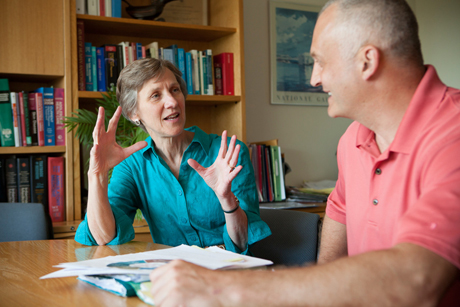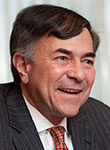$5M gift propels plans for upgraded health care facility
By Diane Lebo Wallace

Cornell is in the planning stages of upgrading and expanding the Gannett Health Services facility – to 96,000 square feet, up from 38,000 – by 2017. In July, Cornell Board of Trustees Chair Robert S. Harrison ’76 and his wife, Jane, made a lead gift of $5 million in support of the $55 million project.
“We’ve become very adept at making our patients comfortable and ensuring their privacy, but there is no question that student demand for health services has outgrown the capacity of our Gannett facility to provide the amount and the quality of space needed,” explains Janet Corson-Rikert, M.D., associate vice president for campus health and executive director of Gannett Health Services.
The challenges are many: Waiting rooms are often overflowing, several clinicians must share an office designed for one, and stretchers bearing patients must pass through busy public spaces to get to the only elevator. Nurses work elbow to elbow, while lack of observation space forces potentially unnecessary transfers to the hospital emergency room.
What is more, Corson-Rikert explains, the building, which opened in 1956, was designed for an outdated model of health care delivery. Today, Cornell is recognized as a national leader for its comprehensive approach to student health and well-being. “It is critical that we adapt to meet the needs and foster innovation to better support the learning mission of the university,” she says.
Harrison says that despite the challenges and limitations, Gannett has achieved “the gold standard in providing integrated health services on a college campus because of the tireless efforts of Vice President Susan Murphy and Janet Corson-Rikert and her team.” However, adds Harrison, who is also CEO of the Clinton Global Initiative, “we must make sure that all students continue to receive top-notch health services, and transforming the university’s health facility is critical to our ability to do so.”
Last spring, under Harrison’s leadership, the board approved the first phase of design for the center’s renewal and expansion. “Medical advances and new health care prevention and treatment models have made it possible to provide our students with better health care than ever before,” he says. “With new medications and technologies, students whose medical or mental health conditions in years past would have prevented them from attending Cornell today can successfully earn their degrees.”
Gannett was funded in part by the Gannett Foundation, a legacy of newspaper publisher Frank E. Gannett, Class of 1898. It was last renovated in 1980 to serve 16,400 students – some 5,000 fewer students than today’s overall student population of 21,400.
Last year Gannett logged more than 100,000 health care visits, up from 40,000 in 1980. More than 80 percent of students use its services at least once each year. Visits to Counseling and Psychological Services have nearly tripled since 1996.

To serve the campus, Gannett Health Services has grown to 161 full-time employees, up from 104 in 1996. That increase helps address not only a larger student body and its need for increasingly complex services, but also growing responsibilities to address public health mandates and emerging health issues like pandemic influenza.
Reconfiguring Gannett’s space also will support collaborations between medical and mental health providers that are a hallmark of Cornell’s integrated health care approach as well as make essential code compliance and infrastructure upgrades.
The funding model for the expansion and renovation of Gannett is a unique partnership among the deans of all of the schools and colleges, the administration (including a lead investment from Student and Academic Services) and donors. Two-thirds of the funding is in place, but the remainder must be raised through philanthropy. The Harrison gift is a major boost for the project.
“Our health services center has strained beyond its limits to accommodate the level and types of demand from today’s student population,” says President David Skorton. “By making long-awaited improvements, Cornell will continue to provide the range of convenient, cost-effective and comprehensive care fundamental to student success and achievement.
“I am grateful to Bob and Jane Harrison for stepping forward to make such a generous lead gift toward enhancing our center,” says Skorton.
Diane Lebo Wallace is a writer for Student and Academic Services.
Media Contact
Get Cornell news delivered right to your inbox.
Subscribe